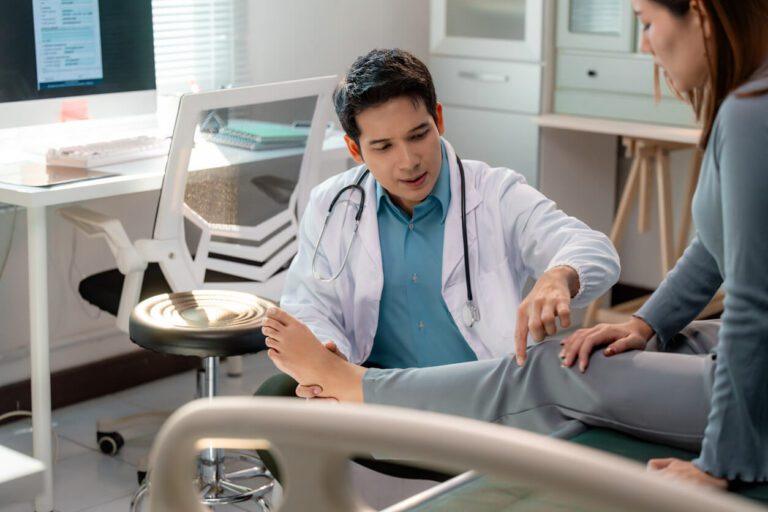
Finding a doctor for knee pain near you is an important step toward relief. Knee pain is a common joint issue in the United States, affecting people of all ages. It can result from injuries, arthritis, or wear and tear. Many people are unsure which doctor to visit or what to expect during their appointment.
This guide addresses common questions about seeing a doctor for knee pain. It explains when, where, and how to seek help. We will cover topics such as the following:
- Best Doctors for Knee Pain: Orthopedists are the main specialists, but other providers can also help.
- When to See a Doctor: Seek help for persistent pain, swelling, or an injury that limits your movement.
- Choosing the Right Specialist: Look for a board-certified specialist who can create a personalized plan for you.
With this information, you can feel more confident in your healthcare choices and take the right steps toward recovery.
1. What is the Best Doctor to See for Knee Pain?
Orthopedic doctors, also known as orthopedists, are the primary specialists for knee pain. They focus on diagnosing and treating issues with the musculoskeletal system. This includes bones, joints, ligaments, and tendons. An orthopedist can thoroughly evaluate your knee.
Depending on the cause of your pain, other specialists might be involved.
Sports medicine doctors are ideal for athletic injuries. Rheumatologists specialize in autoimmune conditions like rheumatoid arthritis. Physical medicine specialists focus on nonsurgical treatments and rehabilitation.
If surgery is needed, an orthopedic surgeon is the right choice. They are specially trained in knee-specific surgical procedures.
2. What Will an Orthopedic Doctor Do for Knee Pain?
They will begin with a detailed assessment, including a physical exam of your knee. They will also review your medical history. This helps them understand your symptoms and identify possible causes.
According to the Mayo Clinic, if necessary, the doctor may order imaging tests. X-rays can reveal bone issues like fractures or arthritis. Meanwhile, an MRI provides detailed images of soft tissues such as ligaments, tendons, and cartilage. These tests help confirm the diagnosis.
Treatment usually starts with nonsurgical options. These may include medications to ease pain, as well as injections, bracing, or physical therapy.
If these methods do not provide relief, the doctor may discuss surgical options. These can range from minimally invasive arthroscopy to total joint replacement.
3. Which Specialist is Best for Knee Pain?
The answer depends on the cause of your pain. Orthopedic surgeons are ideal for serious injuries and advanced arthritis. They are also the best option for conditions that may require surgery.
Sports medicine doctors focus on treating athletes and active individuals. They address issues like ACL tears or meniscus injuries. Rheumatologists specialize in managing inflammatory conditions, such as rheumatoid arthritis or gout.
Primary care doctors are often the first step. They can diagnose many common knee problems and refer you to the right specialist if needed.
4. When Should I See a Doctor for Knee Pain?
Seek medical attention if your pain does not improve with self-care or if certain symptoms arise.
According to the Cleveland Clinic, you should see a knee specialist if:
- The pain lasts more than a few weeks.
- You experience ongoing swelling and stiffness.
- You have limited mobility.
- You sustain a sudden injury.
- You hear a popping sound.
- You cannot put weight on your leg.
- The pain disrupts your sleep, work, or daily activities.
Ignoring persistent knee pain can lead to further damage. Getting a timely diagnosis can prevent long-term issues. It can also improve your chances of a successful recovery.
5. What Treatments Might a Doctor Recommend for Knee Pain?
The treatment plan will be tailored to your diagnosis, lifestyle, and overall health. Options typically fall into two categories: nonsurgical and surgical.
Nonsurgical options include the following:
- Rest and activity modification: Avoid movements that worsen the pain.
- Physical therapy: Strengthens muscles and improves flexibility.
- Bracing: Provides knee support and stability.
- Pain relievers: Includes over-the-counter or prescription options.
- Injections: Includes corticosteroids or hyaluronic acid to reduce inflammation.
Surgical options include:
- Arthroscopy: A minimally invasive procedure to repair tissue damage.
- Ligament repair: For example, reconstructing a torn ACL.
- Knee replacement: Involves replacing damaged parts of the joint with artificial components. This can be partial or total.
Your doctor will recommend the best approach based on your specific needs.
6. How Do I Find the Right Doctor for Knee Pain Treatment Near Me?
Choosing the right doctor for knee pain near you is essential for effective treatment.
Start by looking for a board-certified orthopedic surgeon or knee specialist. Board certification ensures the doctor has met rigorous training and expertise standards.
Consider their experience with your specific condition. This is because some doctors focus on sports injuries while others specialize in arthritis.
It is also helpful to check the reputation of the hospital or clinic where they practice. Also, read patient reviews for additional insights.
A strong doctor-patient relationship is key. The doctor should listen to your concerns and clearly explain your treatment options. The right doctor will collaborate with you to develop a personalized care plan tailored to your needs.
The Best Doctor for Knee Pain in Ft. Lauderdale, FL
Knee pain can vary from a minor inconvenience to a serious joint issue. Choosing the right doctor for knee pain near you is crucial for a successful recovery. Orthopedic specialists are often the best option, though other experts may be needed depending on the cause. Do not let knee pain hold you back.
If you are dealing with persistent knee pain, do not wait to seek help. Schedule an appointment with a doctor to find relief. Trust Paul Meli Orthopedic Surgery’s Dr. Paul Meli. He is a board-certified and fellowship-trained orthopedic surgeon. Call us at (954) 324-7711 or submit an online appointment request form.
The best sports medicine doctor near you looks forward to serving you!

